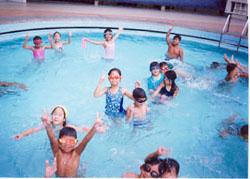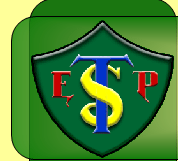|
|
English Proficiency Goals for TSEP by Grade
Below is a modified curriculum to show you what your children will be learning, and will be expected to learn, in each respective grade.
| Grade |
Goal |
| 1 |
In grade one, students begin at the most basic level – learning their ABC’s and how to count, and will continue on learning basic sentence structure enabling them to communicate with their teacher in English by the end of the year. In addition, a large amount of vocabulary is acquired in order to give them the ability to use the language effectively. By the end of the year, students should be able to communicate on a basic level, including asking and answering simple questions, describing people and objects, and giving short explanations.
Examples of areas of study for grade one: greetings; how to describe themselves and others (age, name, disposition, appearance); basic/important verbs and how to conjugate them in the present and present continuous; how to ask questions (who, what, where, when, why, how); how to give and follow directions; how to describe objects (shape, color, size, age); how to tell time; possession (apostrophe); dates (month, year, day); numbers (1-1000); commands; and a large vocabulary of basic objects (food, clothes, body, transportation, school supplies, animals, family and friends, rooms in a house, etc. etc.). |
| 2 |
At the second grade level, students begin to read and write independently. Students will have many opportunities to use the spoken language. They learn that there are different purposes for speaking and listening. When they do speak before their classmates about an announcement or a story, they will be able to hold their attention. They will by now have a good-sized vocabulary which they can utilize toward speech fluency. They will also have the knowledge and vocabulary to inquire about words they do not recognize. Vocabulary will also be acquired through increased reading lessons. They will gain an interest and ability to read silently for education and enjoyment and use reading to gain comprehension of the language itself.
|
| 3 |

At the third grade level, students are expected to have enough background in phonics to be able to read and spell unknown words. The amount of reading increases and its content will be more varied than in previous grades. Students learn the writing process, writing strategies, and writing applications. Speaking is encouraged, especially brief oral presentations to the class. The student will be able to listen to another speaker and be able to retell, paraphrase, and explain what has been said.
Grammar identification is strengthened. Students begin to learn not only the use and function of grammar at this level, but the actual vocabulary to identify it (i.e. synonym, antonym, homophones, etc.). In addition, prefixes and suffixes will be explored, with the ability to decode a word through its root and prefix and/or suffix. Dictionaries will enter on a more serious level, more in words than with pictures. Students will be able to use one easily and have a fair understanding of the definition.
In reading comprehension, students will be encouraged to recall facts and chronological order of a story, picking out the main idea when prompted. They will also learn to describe facts, characters, and a basic plot summary of a story they have heard or read. The difference between fiction and non-fiction will be introduced.
In writing and speaking, children are expected to use complete, and correct sentences. They should be able to spell a large number of words and arrange them easily into alphabetical order. They should also be able to describe the meaning of words briefly to others when asked. In addition, their penmanship should improve to be more legible and correct than in previous grades.
|
| 4 |
At the fourth grade level, students begin to rapidly increase their skills in various areas, because they have now reached the point where the language is no longer a barrier but a facilitator. They are able to speak freely, and can talk to the teacher at length, having full conversations. Students are also able to explain fully meanings and can answer “Why?” with details. Teachers find that the students’ listening and speaking levels are very high, but at this stage, writing, reading, and grammar must be focused on and strengthened. Children are encouraged to think, analyze, and imagine as opposed to memorize, repeat. Critical reading is begun seriously at this grade. Students analyze characters and plot at a basic level, and form opinions and their own critiques on what they read. They are encouraged to express these critiques orally and on paper. Children are also encouraged to read more difficult works and to learn vocabulary naturally through the context of their reading. There is also a focus on reaching a higher level of understanding on grammar and how to use it correctly, especially punctuation marks. Finally, writing is also focused on, particularly writing one what the student is thinking and making sure the text is as error-free as possible. Students will learn various forms of writing, such as “the letter,” and will use this writing for their real life – students will have the opportunity to become “pen pals” or establish correspondence with children of relative age in the United States and/or Australia.
|
| 5 |
In grade five, more complicated and varied aspects of the English language will be looked into. Students will continue with their critical reading skills, expanding them into more areas, and learning how to articulate their opinions better. This will also help rapidly increase their speaking skills (particularly in public speaking), vocabulary, especially into more complex words and meanings. At this stage, students will also begin to learn how to do basic research, particularly through using encyclopedias in the library, and using various research tools on the internet (like encyclopedias, dictionaries, almanacs, etc.). Students will use this new skill to create their own reports on various subjects (animals, countries, culture, government, etc.), and then use it to present to the class in an organized form. The use of these research methods will help the student increase his or her writing, speaking, and reading skills.
In addition, students will improve their listening skills by interacting with each other and implementing their critical thinking skills. Children will be asked to listen to the oral reports of their fellow students and give their own assessment. This requires a child to listen carefully and evaluate what he or she hears.
|
| 6 |

By stage 6, students will have mastered a high level of fluency of spoken English and will be able to comprehend the majority of what s/he hears. Reading and writing will be emphasized to raise their levels appropriate to the student’s ability orally and aurally.
Literature, in various forms and styles (short story—fiction/non-fiction, poetry, newspapers, etc.), will be introduced to the student. The student will already have the tools to analyze and criticize a work, and now those skills will be greatly expanded to encourage critical reading and thinking skills in the individual.
This increase will enable students to determine word meanings more easily through context, and to compare and explain connotation (i.e. softly, quietly). It will also ease their learning of multiple-meaning words as their comprehension increases. They will also begin to analyze texts through the use of outlines, continuing the use of notes, and furthering their ability to write summaries and reports on what they read, listen to, and see. They will also be able to identify the different types of fiction within literature and describe them. They will also be able to make inferences and conclusions about the text based on what they have already read.
Students will now learn how to write a multiple paragraph composition, which shows a clear purpose with a demonstrated topic. Research reports will be expanded from instruction in previous grades. Students will be more independent in their gathering of knowledge (research), and also in their ability to analyze and report it. A major report on a chosen country of the world will be assigned at some point in the school year. The internet will also be integrated within their research and learning.
Students by now will be expected to have excellent punctuation skills in their writing. This will be reviewed and checked diligently, especially the most basic of punctuation. More complex punctuation as the use of colons, semi-colons, and the use of commas as a conjunction, will also be explored.
Speaking will be encouraged, especially more complex and analyzed ideas. Students will no longer be able to give a simple answer to the question (if it is not required), but must be able to fully express themselves in a comprehendible manner, using their vocabulary instead of body language or falling back on their native tongue. Speaking clearly, using the appropriate pacing, phrasing, intonation, expression, gestures, and vocal projection will also be stressed. They will learn how to use persuasive skills when giving an oral presentation to the class or others.
|
| 7 |
coming soon |
| 8 |
coming soon |
|




